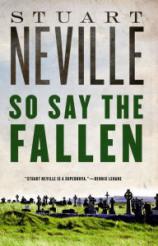So Say the Fallen
Review
So Say the Fallen
Anyone with an interest in police procedural mysteries --- or, for that matter, solid writing and storytelling --- should be reading Stuart Neville’s Belfast novels. They are joined together not so much by continuing characters as by location, which gives Neville the ability to focus as he wishes on plot or character. SO SAY THE FALLEN is the sixth and latest of these, and yet again marks the return of troubled Detective Chief Inspector Serena Flanagan of the Lisburn office of the Police Service of Northern Ireland.
"Neville nicely balances the crime investigation and what is going on behind the scenes on both the criminal and law enforcement ends with Flanagan’s domestic problems."
Neville eschews a complex plot for a straightforward examination of a crime, and does so with brilliant results. Flanagan is called upon to supervise what is intended to be a perfunctory investigation of what is all but an open-and-shut suicide. This is not by rote or accident; Flanagan is still recovering from a duty-induced trauma that continues to affect her professionally and personally. With regard to the latter, she is all but estranged from her family. An easy investigation, it is thought, might be just the berries, as far as getting her back on track. The deceased is Henry Garrick, a very wealthy local resident whose comfortable life was shattered by injuries sustained in an automobile accident that left him partially paralyzed and irreparably maimed. Garrick appears to have committed suicide by overdosing on pain medication, and sometimes things look exactly as they are. Everyone is ready to sign off on the death as tragic, but nothing else.
Still, something is bothering Flanagan about the death scene, and she cannot let go of it. Her suspicions fall on Roberta, Garrick’s beautiful, grieving widow. Neville does a fabulous job here of portraying Flanagan’s self-doubt, given that she feels a bit envious of the Garricks’ wealth. Tragedy has plagued the family before, and Flanagan is left wondering if there is more involved here than a man who decided to prematurely end the hopelessness of his situation. Flanagan is right, of course. Neville lets the reader in on what is going on, so that the police, Flanagan included, are playing catch-up throughout much of the book. However, law enforcement isn’t the only entity being played here. Another questionable suicide occurs that makes Flanagan all the more suspicious, even as she is encouraged from more than one quarter to back off.
Meanwhile, Neville has a few surprises in store not only for Flanagan, but also for his readers. We learn soon enough that things are bad; we just don’t know how bad they are until we approach the conclusion of Neville’s measured, well-paced narrative.
It is worth repeating that SO SAY THE FALLEN is not a complex book by any means. But Neville nicely balances the crime investigation and what is going on behind the scenes on both the criminal and law enforcement ends with Flanagan’s domestic problems. The latter are handled very realistically and even-handedly; while we see things, good and bad, primarily from Flanagan’s point of view, it is obvious that this is one of those “life gets in the way” situations that may or may not be fixable in the near or long term. It’s an interesting interlude to the crime(s) at hand, and well-presented, so it’s easy to see why Neville’s work has been shortlisted for various literary awards on multiple occasions. SO SAY THE FALLEN should increase the audience he has earned and deserves.
Reviewed by Joe Hartlaub on September 30, 2016
So Say the Fallen
- Publication Date: June 6, 2017
- Genres: Fiction, Mystery, Psychological Suspense, Psychological Thriller, Suspense, Thriller
- Paperback: 336 pages
- Publisher: Soho Crime
- ISBN-10: 1616958359
- ISBN-13: 9781616958350











